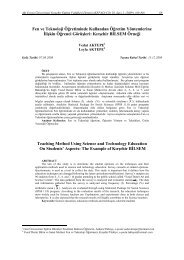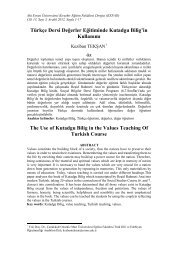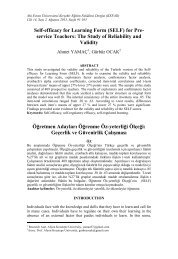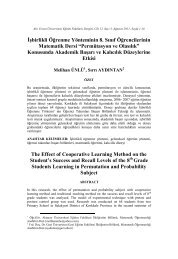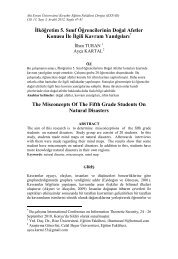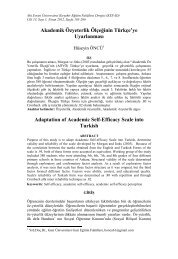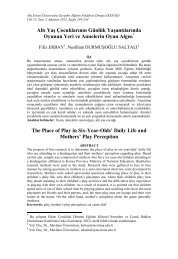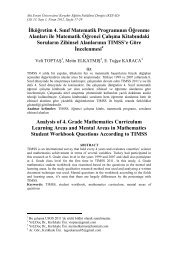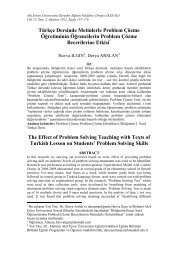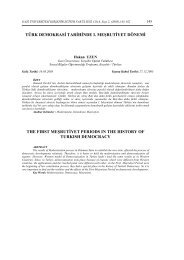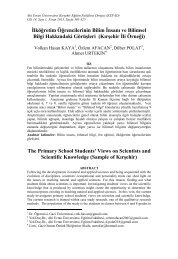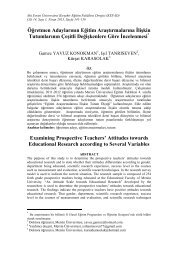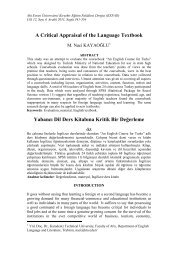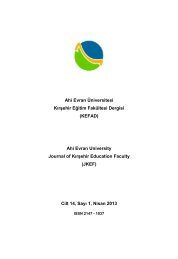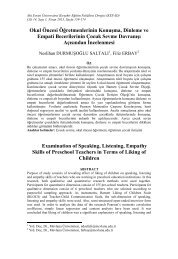Anahtar Sözcükler - KEFAD
Anahtar Sözcükler - KEFAD
Anahtar Sözcükler - KEFAD
Create successful ePaper yourself
Turn your PDF publications into a flip-book with our unique Google optimized e-Paper software.
Ahi Evran Ünv. Kırşehir Eğitim Fakültesi Dergisi, Cilt 11,Sayı 4, Aralık 2010 Özel Sayı, Sayfa 79-96<br />
Horizon of Science Education Reform in Turkey:<br />
Challenges Ahead<br />
Serhat İREZ 1 , Mustafa ÇAKIR 2<br />
ABSTRACT<br />
This paper presents a research study aimed at providing an account on Turkish biology<br />
teachers‟ views on the nature of scientific inquiry and assessing if these views comfort the<br />
vision and epistemological foundations of the new secondary biology curriculum. To this<br />
end, the paper starts with a comparison of the visions and perspectives on the nature of<br />
scientific inquiry presented by the previous and the new biology curricula in order to<br />
document the scale of shift on understandings between the two. This analysis is followed<br />
by the results of a research study conducted on 113 practising biology teachers‟ views of<br />
the nature of scientific inquiry. The results indicated that understandings of current<br />
biology teachers are generally objectivist in nature which, arguably, constitutes the major<br />
barrier for the successful implementation of the curriculum reform as intended. Finally,<br />
the article will be concluded with a discussion on the challenges ahead for successful<br />
implementation of the new curriculum.<br />
KEYWORDS: Curriculum reform, biology teachers, nature of science<br />
Türkiye’de Gerçekleşen Fen Eğitimi Reformunun<br />
Geleceği:<br />
Aşılması Gereken Engeller<br />
ÖZET<br />
Bu çalışma Türk ortaöğretim biyoloji öğretmenlerinin bilim ve bilimin doğasına yönelik<br />
anlayışlarını tespit etmek ve bu anlayışların yeni ortaöğretim biyoloji programının<br />
vizyonu ve epistemolojik temelleri ile uyumlu olup olmadığını araştırmak amacı ile<br />
yapılmıştır. Bu amaçla, çalışmanın ilk kısmında eski ve yeni biyoloji öğretim<br />
programlarının vizyonları ve bilimin doğasına bakış açıları yaklaşımlardaki farklılığın<br />
boyutlarını ortaya koyabilmek için karşılaştırılmıştır. Bu analizi 113 hizmet-içi biyoloji<br />
öğretmeninin bilimin doğası ile ilgili anlayışlarının araştırıldığı bir çalışmanın sonuçları<br />
takip etmektedir. Bu çalışmanın sonuçları çalışmaya katılan öğretmenlerin genel olarak<br />
objectivist bir bilim anlayışına sahip olduklarını göstermektedir. Bu durum yeni öğretim<br />
programının başarılı bir şekilde uygulamaya konulmasının önündeki en önemli engel<br />
olarak durmaktadır. Çalışma yeni öğretim programının başarılı bir şekilde<br />
uygulanabilmesinin önündeki engellerle ilgili bir tartışma ile sona ermektedir.<br />
ANAHTAR KELİMELER: Öğretim programı reformu, biyoloji öğretmenleri, bilimin<br />
doğası<br />
1 Yrd.Doç.Dr., Marmara Üniversitesi, sirez@marmara.edu.tr<br />
2 Yrd.Doç.Dr., Marmara Üniversitesi, mustafacakir@marmara.edu.tr
80 Horizon of Science Education... S. İrez, M. Çakır<br />
INTRODUCTION<br />
The twentieth century has experienced more social transformations than any<br />
other period in history due to the introduction of sophisticated communication<br />
technologies and recent developments in science. Revolutionary advances in the<br />
last century have proven that the horizons of science and technology are beyond<br />
our imagination. We have unravelled the mystery behind DNA and transcribed<br />
the entire genetic code of a human being, discovered antibiotics, travelled in<br />
space, etc. Progress in science and technology has brought unbelievable comfort<br />
to our lives. However, the twentieth century has also brought the dark and<br />
dangerous side of many scientific developments to public awareness. The image<br />
of science has been tarnished by a succession of scientific and technological<br />
developments with unforeseen environmental and societal consequences, such as<br />
DDT, the depletion of the ozone layer and Chernobyl (Millar & Osborne, 1998).<br />
In addition, many scientific developments, such as genetic manipulation and<br />
cloning, have led to public unease about their applications (Ibid). Indisputably,<br />
science has become a fundamental aspect of our culture and social life in the past<br />
century (DeBoer, 1991). Hurd (1998) argues that it is difficult to discuss human<br />
values, political and economic problems, or educational objectives today without<br />
a consideration of the role played by science.<br />
Along with these revolutionary advances, the practice of science has also<br />
changed dramatically in the last century. Hurd (1998) argues that the traditional<br />
concept of a discipline (biology, chemistry, physics, earth science) as entities no<br />
longer have much meaning beyond that of cataloguing university and school<br />
science courses. Disciplines have now become fractionated into an unknown<br />
number of research fields each with its own language and research practices.<br />
Technological equipments have become the primary determinants of what could<br />
be studied and what is likely to be discovered in science. The scope of practices<br />
in science has also changed: less attention is being devoted to the establishment<br />
of new theories and laws, a procedure formerly recognized as basic research.<br />
Today more attention is focused on the functional aspects of science/technology<br />
as it relates to human welfare, economic development, social progress, and the<br />
quality of life (Ibid). Scientific research has become multi-disciplinary, multiauthored<br />
initiative supported by industry. Today 60% of all scientists are<br />
employed in industry, 35% in universities, and 5% are self-employed (Ibid).<br />
Science is not an individual and intellectual enterprise as once did, it is a social<br />
activity initiated, funded, directed and, sometimes abandoned by society.<br />
Our understanding of the nature of scientific inquiry has also experienced a<br />
major transformation in the last century. Positivistic understanding of scientific<br />
inquiry which defends the application of inductive methods and argues that<br />
science employs value-neutral experimental observation which yields the<br />
discovery of incontestable facts about nature has fallen out of favour.<br />
Contemporary understanding of science describes science as a special way of<br />
knowing and argues that scientific inquiry is shaped „ineluctably‟ by human
Ahi Evran Ünv. Kırşehir Eğitim Fakültesi Dergisi (<strong>KEFAD</strong>), Cilt 11, Sayı 4, Aralık 2010 Özel Sayı 81<br />
values, scientific knowledge is produced rather than discovered, scientific<br />
observation is theory laden (Kuhn, 1970), and that there is no single correct<br />
scientific method (Lakatos, 1970).<br />
These changes in the practice science and perception of the nature of scientific<br />
inquiry have revealed a need to re-examine the traditional purposes of science<br />
education (Hurd, 1998). In 1970, the National Science Foundation Advisory<br />
Committee for Science Education in the United States recommended that the<br />
traditional approach to science education in the sciences be rethought with more<br />
„emphasis on the understanding of science and technology by those who are not<br />
and do not expect to be professional scientists and technologists‟ (Report, 1970,<br />
p. iii, cited in Hurd, 1998: 409). The implication is that notions of scientific<br />
literacy should be embedded in contexts that promote a socially responsible and<br />
competent citizen (Ibid). Achieving functional scientific literacy involves<br />
providing people with an understanding of science that they can use as they<br />
make decisions and engage in debate about scientific and technological issues<br />
outside formal education settings (Ryder, 2001). In this sense, educating for<br />
scientific literacy entails not only teaching science concepts and theories but also<br />
teaching about the nature of these concepts and how they function with regard to<br />
other beliefs about the physical world (Eichinger, Abell, & Dagher, 1997).<br />
Therefore, teaching and learning about the nature of science (NOS) has been the<br />
focus of attention in science education circles as a primary component of<br />
scientific literacy (Bell & Lederman, 2003; Meichtry, 1999; Tairab, 2001). In the<br />
last thirty years, discussions concerning a role for the NOS in school science<br />
have increased and few now argue with the proposition that school science<br />
experiences should include significant attention to how science works, including<br />
how knowledge is created and established (McComas, Clough, & Almozroa,<br />
1998).<br />
Today, calls for reform in science education in Turkey are as loud and clear as<br />
elsewhere in the developed world. Like many governments around the world, the<br />
Turkish government is aware of the importance of preparing its citizens for the<br />
challenges of the new century, and has introduced many reforms at various levels<br />
of education in the last ten years. The latest of these reform efforts took place in<br />
the secondary education. With this movement, both the structure and content of<br />
the secondary education was targeted. The length of the secondary education,<br />
which was three years, has become four years. The content and philosophy of<br />
secondary education has also been targeted. In secondary biology, for example, a<br />
new curriculum and teaching materials have been introduced. This new<br />
curriculum has presented a new vision for the aims, learning and teaching<br />
approaches, and methods of assessment for secondary biology teaching. More<br />
importantly, the new curriculum has presented a new understanding with regard<br />
to the nature of scientific knowledge. Before proceeding any further in our<br />
discussion, then, we must analyse what kind of new approaches this reform<br />
movement have brought about for school science in Turkey. It is also useful to<br />
compare the conceptual framework of the new curriculum with that of previous
82 Horizon of Science Education... S. İrez, M. Çakır<br />
one in order to understand the scale of the shift. In line with the aims of this<br />
study, the previous and new biology curricula are compared with regard to their<br />
curriculum emphases and approaches to the nature of scientific inquiry.<br />
Science Education Reform in Turkey: A Paradigm Shift?<br />
Curriculum Emphases<br />
One of the important steps in curriculum development process is the<br />
identification of coherent set of messages to the student about science (Roberts,<br />
1982). Because, Roberts argues, such messages „constitute objectives which go<br />
beyond learning the facts, principles, laws, and theories of the subject matter<br />
itself – objectives which provide answers to the student question: “Why am I<br />
learning this?”‟ (p. 245). This answer to this question reflects the emphasis on<br />
what is valued and desired in the curriculum. Roberts calls this curriculum<br />
emphasis and, discusses and describes seven different emphases utilized by<br />
curriculum developers in the last century. He argues that each emphasis,<br />
naturally, shapes the content and the structure of the curriculum.<br />
The framework and classification defined by Roberts was used in analysing the<br />
differences regarding the emphases of both curricula. To this end, the overall<br />
objective of the previous biology curriculum emerged as;<br />
... to help individuals who will constitute the science-society to<br />
acquire scientific problem solving skills for the problems they<br />
may encounter in their everyday life ... (Ministry of National<br />
Education [MNE], 1998: 131).<br />
This overall objective was followed by a list of attainment targets. „Learning the<br />
general structure of living things‟ was, somewhat inconsistent with the overall<br />
objective, on the top of the list. This was followed by „learning about and caring<br />
environment‟ and „developing habits needed for a healthy life‟. Parallel to these<br />
attainment targets, the previous curriculum put emphasis on the learning of<br />
biology content and developing skills to solve everyday problems utilizing a<br />
scientific approach.<br />
In light of this analysis, the previous curriculum‟s approach falls into the Correct<br />
Explanations and the Everyday Coping emphasis in Roberts‟s (1982) framework.<br />
Roberts argues that the Correct Explanations emphasis stresses science products<br />
that are accepted by scientific community. This emphasis gives the messages<br />
„master now, question later‟ (Ibid.). The Everyday Coping emphasis, on the<br />
other hand, declares that science is an important means for understanding and<br />
controlling one‟s environment (Ibid).<br />
The overall objective, or the „vision‟ as it is called, of the new curriculum is<br />
stated as;
Ahi Evran Ünv. Kırşehir Eğitim Fakültesi Dergisi (<strong>KEFAD</strong>), Cilt 11, Sayı 4, Aralık 2010 Özel Sayı 83<br />
... to educate scientifically literate individuals that understand<br />
the nature of science…<br />
appreciate the necessity of learning biology… possess adequate<br />
cognitive conceptual frameworks regarding biological<br />
concepts… comprehend the relationship between sciencesociety-technology…<br />
approach problems with the principles of<br />
scientific inquiry. (MNE, 2007: 3).<br />
The structure and content of the new curriculum were shaped in order to achieve<br />
the overall objective. To this end, the new curriculum targets developing skills<br />
and attitudes related to the aforementioned overall objective (that is educating<br />
scientifically literate citizens) as well as developing knowledge of biology. The<br />
attainment targets are divided into three groups in the new curriculum. These are;<br />
a) Science-Technology-Society-Environment, b) Communication Skills, Attitudes<br />
and Values, c) Scientific Inquiry and Science Process Skills.<br />
Considering such an overall objective and related attainment targets, the new<br />
curriculum‟s emphasis bears the aspects of three emphases in Roberts‟s (1982)<br />
classification. These are the Structure of Science emphasis, the Science,<br />
Technology, and Decisions emphasis and, the Scientific Skill Development<br />
emphasis.<br />
The new curriculum‟s emphasis includes the Structure of Science emphasis as it<br />
stresses and gives messages about how science functions intellectually in its<br />
growth and development (Roberts, 1982). The new curriculum targets student<br />
understanding on the nature and status of scientific knowledge, the interplay<br />
between evidence and theory, the role of models for explaining natural<br />
phenomena, the subjective nature of science, etc. Unlike the previous<br />
curriculum‟s emphasis on Everyday Coping, the new curriculum puts an<br />
emphasis on the limits of science in coping with practical affairs. The new<br />
curriculum also stresses the development of scientific process skills as opposed<br />
to learning the products or content of science, which were emphasized in the<br />
previous curriculum.<br />
To conclude, as discussed above, the two biology curricula have radically<br />
different emphases regarding the objective of biology education at secondary<br />
level. This difference in the emphases shows that these two curricula have<br />
different worldviews. Consistent with their difference in worldviews, analysis<br />
revealed that the two curricula also have different understandings about the<br />
nature of science and scientific knowledge.<br />
The Nature of Scientific Inquiry<br />
Close inspection of the two curricula reveals that while the previous biology<br />
curriculum presented the nature of knowledge from a positivist perspective, the<br />
new curriculum presents a constructivist perspective. Science, for example, was
84 Horizon of Science Education... S. İrez, M. Çakır<br />
defined as „cumulative knowledge gathered through observations and<br />
experiments‟ (MNE, 1998: 139) in the previous biology curriculum. What is<br />
immediately evident from this description is an introduction of science as body<br />
of knowledge. The view that science represents a body of knowledge was<br />
implicitly supported in the following units by portraying biology as a collection<br />
of facts. For example in the unit titled Views about the Origins of Life in which<br />
the theory of evolution was introduced, the curriculum stated that;<br />
... the factual knowledge in biology was presented in the earlier<br />
sections, this section, however, presents interpretations of<br />
these. (MNE, 1998: 211).<br />
Such a description of science and scientific knowledge also underpinned another<br />
view that there is an existing truth or reality out there and science represents the<br />
way of reaching that reality or truth. This view portrayed science as a process of<br />
discovering (or collecting, exploring) what is out there. The previous curriculum<br />
presented this process as the scientific method. The scientific method, according<br />
to the previous curriculum, was a step-wise and universal procedure in science.<br />
The previous curriculum‟s expectations from the students were;<br />
Write and/or articulate the steps of the scientific method.<br />
Decide whether the steps of the scientific method were used in<br />
a given example of a scientific investigation.<br />
Write and/or articulate that it is required to follow the steps of<br />
the scientific method in the solution of problems in biology.<br />
(MNE, 1998: 139-140)<br />
The previous curriculum saw following the steps of scientific method as<br />
necessary in order to produce and guarantee objective knowledge. Another<br />
requirement in obtaining objective knowledge in science, according to the<br />
previous curriculum, was the characteristics that scientists should have.<br />
(Students should)<br />
Explain the characteristics that a scientist should have.<br />
(MNE, 1998: 139)<br />
Further, the previous curriculum suggested teachers to ask questions such as<br />
„List the characteristics of a scientist‟ in the assessment of learning. Although<br />
the curriculum did not provide a list of these characteristics, the textbooks that<br />
used the previous curriculum as the framework did. The research study by Irez<br />
(2009) revealed that the secondary biology textbooks reflecting the previous<br />
curriculum‟s approach provided list of characteristics that a scientist should<br />
have. These included characteristics such as being objective, honest, hardworking,<br />
determined, logical, and sceptical amongst many others.
Ahi Evran Ünv. Kırşehir Eğitim Fakültesi Dergisi (<strong>KEFAD</strong>), Cilt 11, Sayı 4, Aralık 2010 Özel Sayı 85<br />
On the other hand, science is described from a constructivist perspective in the<br />
new biology curriculum. For example, the new curriculum introduces science as<br />
a dynamic process of generating testable and falsifiable explanations about<br />
natural phenomena.<br />
(students should)<br />
Develop an understanding that science [scientific knowledge]<br />
has testable, experimental and falsifiable nature.<br />
Realize that scientific knowledge is tested, corrected or<br />
renewed in the light of new evidence. (MNE, 2007: 17)<br />
These statements also imply the tentative nature of scientific knowledge. Indeed,<br />
in various places, the new curriculum emphasizes that all scientific knowledge is<br />
subject to change. It views the tentativeness of scientific knowledge from a<br />
Kuhnian perspective in that change in science is explained as a paradigmatic<br />
shift.<br />
(Students should)<br />
Explain the role of evidence, theories and/or paradigms in<br />
change of scientific knowledge.<br />
Realize that change in science is continuous and sometimes<br />
in the form of paradigmatic shift. (MNE, 2007: 17)<br />
In contrast to the previous curriculum, the new curriculum does not present<br />
science as an objective enterprise. Instead, it suggests that science and society<br />
influence each other and perceives science as a product of society and humanculture.<br />
(Students should)<br />
Understand that socio-economic and cultural contexts<br />
influence the development of biology.<br />
Understand and gives examples about the contributions of<br />
societies that have different historical and cultural pasts to the<br />
development of biology. (MNE, 2007: 17)<br />
Further, the new curriculum does not claim that scientists should have certain<br />
characteristics to ensure objectivity in science; instead, it discusses that<br />
subjectivity is natural and expected in science.<br />
(Students should)<br />
Realize and discuss the effects of different attitudes and<br />
values in science. (MNE, 2007: 17)<br />
In sum, the analysis conducted with regard to approaches of the previous and<br />
new biology curriculum pointed out a significant difference between their<br />
depictions of science and scientific enterprise.
86 Horizon of Science Education... S. İrez, M. Çakır<br />
What this summary illustrated is that important changes have taken place at<br />
secondary level biology education in Turkey. The curriculum reform experienced<br />
in Turkey has introduced a new world for teachers, which is fundamentally<br />
different from the previous one. Irez and Han (2010) liken this change Kuhn‟s<br />
(1970) paradigm shifts in the history of science. They argue that large scale<br />
educational reforms, as in paradigm shifts in science, bring new conceptual<br />
frameworks, introduce new educational aims and view on how people learn,<br />
require to adopt new teaching and assessment approaches and materials, etc. In<br />
this new educational world, teachers face with new educational aims and new<br />
understanding of the nature of scientific knowledge.<br />
No doubt that the success of any reform attempt depends on the practitioners‟<br />
ability in adequately reflecting the vision of the reform in the classroom.<br />
Teachers‟ proficiency is especially important when it comes to teaching nature of<br />
science as research indicates that a teacher‟s understanding of the NOS affects<br />
his/her students‟ conceptions, and teacher‟s behaviour and the classroom<br />
environment are influenced by the teacher‟s conception of the NOS (Lederman,<br />
1992). To this end, it can be argued that if teachers are to learn how to engage<br />
children in conceptual change instruction related to the NOS, they need to have<br />
informed understanding of the NOS in such a way as to enable them to plan the<br />
curriculum and choose appropriate teaching strategies in their classrooms<br />
(Bentley & Fleury, 1998). What the discussion presented so far indicated is that<br />
the reform movement in secondary biology in Turkey predominantly depends on<br />
biology teachers who have deep and adequate understandings that are consistent<br />
with the vision of the reform. To this end, the following is a research study<br />
aiming at providing an account on Turkish biology teachers‟ views on the nature<br />
of scientific inquiry.<br />
METHODOLOGICAL FRAMEWORK<br />
With the recognition of the need for the NOS within the school science<br />
curriculum, the assessment of teachers‟ understanding of the NOS has been a<br />
focal point for science education research over the years. A wide range of probes<br />
and instruments employing qualitative and/or quantitative approaches have been<br />
developed and used in different studies. We used both methodologies in different<br />
stages of our research program aiming to assess and improve Turkish biology<br />
teachers‟ understanding of the NOS. For the purposes of this study, the first part<br />
of the „Beliefs about Science and School Science Questionnaire‟ (BASSSQ)<br />
which aims to reveal teachers‟ views on scientific inquiry was chosen. One of<br />
the main reasons for choosing the BASSSQ was that the structure and the<br />
orientation of the questionnaire was comparatively suitable to assess whether<br />
Turkish biology teachers‟ ideas were consistent with those stated by the new<br />
biology curriculum. Reflecting the radical change with regard to the nature of<br />
scientific knowledge in the previous and new biology curricula, the BASSSQ<br />
assesses the views regarding the NOS ranging on a continuum from an<br />
objectivist to a constructivist view (Aldridge, Taylor, & Chen, 1997). The
Ahi Evran Ünv. Kırşehir Eğitim Fakültesi Dergisi (<strong>KEFAD</strong>), Cilt 11, Sayı 4, Aralık 2010 Özel Sayı 87<br />
objectivist image of science defends the application of inductive methods and<br />
argues that a true scientist uses value-neutral experimental observation which<br />
yields incontestable facts about nature (Aldridge, Taylor, & Chen, 1997). The<br />
constructivist (or post-modern) view of science, on the other hand, argues that<br />
scientific inquiry is shaped „ineluctably‟ by human values, scientific observation<br />
is theory laden (Kuhn, 1970), and that there is no single correct scientific method<br />
(Lakatos, 1970).<br />
The full questionnaire was designed to measure two dimensions of teachers‟<br />
beliefs: (1) beliefs concerning the teacher‟s view of the NOS, and (2) beliefs<br />
concerning the teacher‟s view of the nature of school science (Aldridge, Taylor,<br />
& Chen, 1997). Thus, the questionnaire comprises two parts: the teacher‟s view<br />
of science and the teacher‟s view of school science. As the purpose of this study<br />
is to present the Turkish biology teachers‟ views on the NOS, only the findings<br />
about the first part of the questionnaire will be presented here.<br />
There are 20 items in this part of the questionnaire and responses to the items are<br />
recorded on a five-point Likert-type frequency response scale. In scoring, each<br />
item response is allocated 1, 2, 3, 4, or 5 points for each of the response<br />
categories. Items aligned with an objectivist view are scored in reverse and,<br />
during statistical analysis, are adjusted accordingly. A scale mean score is<br />
calculated by dividing the total scale score by the number of respondents and the<br />
number of scale items. Thus, the scale mean scores range between 1 (Almost<br />
Never) and 5 (Almost Always). A higher score indicates more constructivist<br />
view of the NOS and a lower score represents more objectivist view.<br />
The questionnaire was translated into Turkish by one of the authors. Then a<br />
panel of three experts compared and revised the translated version of BASSSQ<br />
and concluded that the Turkish version of BASSSQ correctly reflected the<br />
original version. In order to establish the reliability of the instrument, initial form<br />
was piloted with 122 pre-service science teachers. As a result, to have a sound<br />
internal consistency, elimination of four items (items 4, 7, 11, and 14) deemed to<br />
be suitable. Such elimination was not considered problematic as similar strategy<br />
was suggested by the developers of the questionnaire (Chen, Taylor, & Aldrigde,<br />
1997). In order to make the analysis more relevant to our purposes and give more<br />
detailed accounts of Turkish biology teachers‟ views of the NOS, remaining<br />
questions were divided into four sub-scales according to contextual relevance as<br />
subjectivity in science (questions 1, 2, 3, 5, 6 and 10), the nature of scientific<br />
method (questions 8 and 9), the tentative nature of scientific knowledge<br />
(questions 12, 16 and 17), and the relationship between science and society<br />
(questions 13, 15, 18, 19 and 20). Finally, the Cronbach alpha coefficients of the<br />
subscales were found as 0.81 for the nature of scientific method, 0.72 for the<br />
tentative nature of scientific knowledge, 0.69 for the relationship between<br />
science and society, and 0.64 for subjectivity in science subscales.
88 Horizon of Science Education... S. İrez, M. Çakır<br />
The final form of the questionnaire was administered total of 113 practicing<br />
biology teachers in Istanbul area in spring 2009.<br />
RESULTS<br />
Table 1 presents the mean values, standard deviations, standard error of the<br />
means, and the %99 confidence intervals for mean values of biology science<br />
teachers‟ views about subjectivity in science, scientific method, the tentative<br />
nature of scientific knowledge, and the relationship between science and society.<br />
While the participants presented relatively good understanding of the tentative<br />
nature of scientific knowledge (M=3.10) and the role of subjectivity in science<br />
(M=3.06), their views of scientific method (M=1.41) and the relationship<br />
between science and society (M=2.16) were mostly objectivist. Variability of the<br />
views is reflected in confidence interval of the means. Confidence intervals<br />
indicate that biology teachers‟ view of scientific method is the most homogenous<br />
and closer to objectivist while their view of tentative nature of scientific<br />
knowledge is the most heterogeneous.<br />
Table 1. Mean Values, Standard Deviations, and Confidence Intervals (%99) of<br />
Biology Science Teachers‟ Views about Science<br />
Scales<br />
Mean Std. Dev.<br />
SE of the<br />
mean<br />
Confidence<br />
interval (%99)<br />
Tentativeness 3.10 1.28 0,12 2,80-3,40<br />
Science&Society 2.16 1.22 0,115 1,86-2,45<br />
Subjectivity 3.06 1.36 0,128 2,73 -3,39<br />
Scientific Method 1.41 0.67 0,063 1,25-1,57<br />
Figure 1 presents the detailed analysis of the mean values for the questions<br />
related to the nature of scientific method. The mean values for the questions 8<br />
and 9 were quite close to each other (M=1.54 for Q8 and M=1.28 for Q9)<br />
indicating that the participants tended to believe that scientific investigations<br />
start with observations of nature and scientific investigations follow the scientific<br />
method. This finding has been commonly reported in many studies of students‟<br />
and teachers‟ beliefs (e.g., Akerson, Abd-El-Khalick, & Lederman, 2000; Lakin<br />
&Wellington, 1994) and attributed as one of the most widely held<br />
misconceptions about science (Abd-El-Khalick, Lederman, Bell, & Schwartz,<br />
2001; McComas, 1998). As explained earlier, the previous curriculum promoted<br />
the idea of the existence of a universal step-by-step scientific method which<br />
guarantees objective scientific knowledge. From this perspective, the<br />
participants‟ views were in line with the previous curriculum‟s depiction of<br />
scientific method. These views, however, stand in stark contrast to the idea of<br />
scientific method described in the new biology curriculum. Generally, the new<br />
curriculum emphasizes that there is no single scientific method that captures the<br />
complexity of doing science and close inspection of scientists‟ work will reveal
Ahi Evran Ünv. Kırşehir Eğitim Fakültesi Dergisi (<strong>KEFAD</strong>), Cilt 11, Sayı 4, Aralık 2010 Özel Sayı 89<br />
that they approach and solve problems with imagination, creativity, prior<br />
knowledge, and perseverance.<br />
Figure 1. Mean Response Values for the Nature of Scientific Method.<br />
Figure 2 presents the detailed analysis of the mean values for the questions<br />
related to the relationship between science and society. Mean values for the<br />
questions 13, 18, 19 and 20 were relatively low indicating the participants‟<br />
general belief in independence of science from social and cultural aspects.<br />
Generally, the participants believed that scientific knowledge is free of human<br />
perspectives (Q19, M=1.83), is not influenced by myths (Q20, M=1.55) and<br />
social or cultural attitudes (Q18, M=2.38) and, is not relative to the social<br />
context in which it is generated (Q13, M=2.34). Again, all these views are<br />
closely associated with an objectivist view of scientific inquiry which was<br />
emphasized by the previous biology curriculum. The new curriculum, however,<br />
requires biology teachers to give references to human-side of scientific inquiry;<br />
that is, as a social activity, the influence of personal attitudes, values, beliefs as<br />
well as socio-cultural and socio-economic contexts on scientific enterprise. It is<br />
worth to note that the mean values were slightly higher for the question 15<br />
(M=2.82), indicating the participants‟ belief that the evaluation of scientific<br />
knowledge varies with changes in situations. An explanation to this somewhat<br />
contradictory finding might be that this question is closely related to the<br />
tentativeness of scientific knowledge and, therefore, the participants might have<br />
considered this question from the tentativeness point of view. As presented in the<br />
following, the participants‟ views about the tentative nature of science were<br />
relatively informed.
90 Horizon of Science Education... S. İrez, M. Çakır<br />
Figure 2. Mean Response Values for the Relationship between Science and<br />
Society.<br />
The participants reflected relatively informed views regarding the certainty of<br />
scientific knowledge (Figure 3). The mean values for the three questions in this<br />
scale indicated that the participants perceived scientific knowledge subject to<br />
change and modifications in the future. Detailed analysis of the mean values<br />
revealed that the participants generally did not perceived the accuracy of current<br />
scientific knowledge as beyond question (Q16, M=2.81) and presented a<br />
tendency towards the idea that currently accepted scientific knowledge will be<br />
modified in the future (Q17, M=2.98). Importantly, the mean value for the Q12<br />
(Scientific knowledge is tentative) was remarkably high (M=3.36). Although not<br />
at desired level, these findings indicate that participants‟ views about the<br />
tentative nature of scientific knowledge are similar to those stated in the new<br />
curriculum. However, the research literature warns us to handle these findings<br />
with caution. Research acknowledge that individuals have a tendency to accept<br />
scientific knowledge as tentative in first the examination, however, as many of<br />
them do not have well defined concepts of theories, laws, and facts, they do not<br />
attribute the same value to these and perceive some scientific knowledge (e.g.,<br />
laws and facts) as established and certain (Irez, 2006; Mueller & Wavering;<br />
1999).
Ahi Evran Ünv. Kırşehir Eğitim Fakültesi Dergisi (<strong>KEFAD</strong>), Cilt 11, Sayı 4, Aralık 2010 Özel Sayı 91<br />
Figure 3. Mean Response Values for the Tentative Nature of Scientific<br />
Knowledge.<br />
The mean values for the questions assessing the subjectivity in science are<br />
presented in figure 4. Although the total mean value for the questions about<br />
subjectivity in science are relatively high (M=3.06), the detailed analysis<br />
presented in figure 3 shows that this view is far from being straightforward, and<br />
instead, eclectic in nature. While the mean values are quite high in some<br />
questions, the mean values for other questions were notably lower. The<br />
participants agreed that scientific observations depend on what scientists set out<br />
to find (Q1, M=3.65), scientific inquiry involves challenging other scientists‟<br />
ideas (Q2, M=3.38), intuition plays a role in science (Q5, M=3.39) and, scientific<br />
ideas come from both scientific and non-scientific sources. These views are quite<br />
aligned with contemporary understanding of the nature of scientific inquiry. On<br />
the other hand, the participants presented contrasting views about the remaining<br />
two questions in this subscale. Overall, they rejected the idea that scientific<br />
observations are affected by scientists‟ values and beliefs (Q3, M=2.25) and<br />
presented a view that scientists eliminate their beliefs and values when making<br />
observations (Q6, M=2.35). These views are quite in line with the participants‟<br />
responses to the items related to the relationship between science and society in<br />
which the participants presented an objectivist view about the scientific<br />
enterprise.
92 Horizon of Science Education... S. İrez, M. Çakır<br />
Figure 4. Mean Response Values for Subjectivity in Science.<br />
DISCUSSION and CONCLUSION<br />
The main aim of any reform in education is to improve educational programs and<br />
practices which will, in turn, assist to meet overall objectives of education in<br />
more effective ways (Fullan, 1991). Change is a difficult process, because,<br />
educational change of any significance involves changes in organizational<br />
structures, communications, resource allocation, practices, and beliefs and<br />
attitudes (Avenstrup, 2007). Research acknowledges that reform efforts often<br />
face with many challenges, particularly on the part of teachers as their attitudes<br />
and beliefs play important roles in their teaching orientations (Irez & Han, 2010).<br />
Turkish teachers have witnessed many reform movements at all levels of<br />
education in the last decade. The latest of these targeted secondary science<br />
education. With this movement, new science curricula which included new<br />
perspectives on many aspects of school science were introduced. Focusing on the<br />
new biology curriculum, this paper discussed that the most important change has<br />
taken place at the epistemological level. The objectivist characterisation of the<br />
NOS in the previous curriculum was abandoned and a constructivist<br />
understanding of scientific inquiry has been introduced.<br />
Without a doubt, the success of any reform attempt depends on the practitioners‟<br />
ability to reflect the vision of the reform in the classroom. Then, the reform<br />
movement in secondary biology in Turkey predominantly depends on biology<br />
teachers who have deep and adequate understandings that are consistent with the<br />
vision of the reform. However, the findings of this study revealed that biology<br />
teachers in Turkey, generally, have objectivist views about certain aspects of the<br />
NOS (the nature of scientific method and the relationship between science and<br />
society). The results also indicate that the participant biology teachers have<br />
generally eclectic views about the subjectivity in science and the tentative nature<br />
of science. Overall, evidence from this research points out that the participant
Ahi Evran Ünv. Kırşehir Eğitim Fakültesi Dergisi (<strong>KEFAD</strong>), Cilt 11, Sayı 4, Aralık 2010 Özel Sayı 93<br />
biology teachers‟ views were generally compartmentalized and lacked<br />
consistency; features which are expected given that learners are often not<br />
provided with opportunities to reflect on and clarify their views of the NOS<br />
(Akerson et al., 2000). These results should not be surprising considering that<br />
science teacher education programs in Turkey generally do not pay attention to<br />
the conceptual development of prospective science teachers with regard to the<br />
NOS. Courses on the history and philosophy of science are rare (if any) in<br />
teacher education programs, moreover, there are questions over the<br />
understandings and proficiency of teacher educators who are responsible for<br />
delivering such courses (Irez, 2006).<br />
Considering the results of this study, it is not possible to think that the aim of the<br />
new curriculum which is to promote a constructivist view of scientific inquiry in<br />
the nation‟s schools is attainable in the foreseeable future. The importance of the<br />
knowledge and skills the learners already have is well acknowledged in any<br />
learning situation. Similarly, in order to implement the new curriculum<br />
successfully as intended, curriculum reform efforts should take into account of<br />
teachers‟ knowledge, beliefs, and personal philosophies (Cotton, 2006).<br />
Teachers, the real driving forces of reform, undoubtedly need to update their<br />
knowledge, skills, and orientations to be able to implement the new curriculum.<br />
Even when teachers are willing to subscribe to a reform and change their<br />
practices accordingly, research (Davis, 2003; Rousseau, 2004; Van Veen et al.,<br />
2005) reports that there is no guarantee that reform is implemented or sustained.<br />
Furthermore, sometimes teachers developed negative emotions toward the<br />
reform itself.<br />
Of course, in-service teacher education is one of the most important and critical<br />
components of any education reform. Because, the reality in schools is that<br />
teachers are not able to inform their instruction from the curriculum as they lack<br />
a practical framework. Unfortunately, the question of how to help science<br />
teachers incorporate the various aspects of reform pedagogy yet to be answered.<br />
Huffman (2006) reported that while helping teachers to incorporate more<br />
curriculum-dependent changes such as assessment and doing experiments are<br />
relatively easy; helping them to capture the philosophical foundations of the<br />
reform which would necessary to create adequate learning environments is more<br />
problematic. From this perspective, it is difficult consider that in-service courses<br />
aiming to introduce the epistemological perspectives and approaches brought by<br />
the new curriculum to practicing teachers would be effective at a desired extent.<br />
Ensuring a successful reform in science education requires taking a long term<br />
approach and involving teachers from the very beginning so they can achieve the<br />
philosophical re-orientation by adapting new practices to their own<br />
circumstances and the innovations can develop from the within the classroom<br />
(Huffman, 2006). However, the teachers are rarely involved in the initiation,<br />
preparation, design, and development of a new curriculum (Van Veen et al.,<br />
2005). Another way to promote new curriculum is to make it an integral part of
94 Horizon of Science Education... S. İrez, M. Çakır<br />
pre-service teacher education during their science methods courses, school, and<br />
practicum experiences. Research indicate that self-efficacy improves during<br />
course work where teacher candidates can have a professional support from<br />
teacher educators and during school experiences and practicum where they<br />
interact with mentor teachers (Kang, 2008; Woolfolk Hoy & Burke-Spero 2005).<br />
High self efficacy towards new curriculum expected to facilitate transition of<br />
reform into classrooms. What this discussion suggests is that close attention<br />
should be paid to the pre-service preparation of science teachers. Otherwise, the<br />
vast majority of newly trained science teachers will go out into schools with<br />
unexamined and unclear conceptions of the NOS. This would inevitably<br />
jeopardize the promotion of scientific literacy in society which is the overall<br />
vision of the new science curricula.<br />
REFERENCES<br />
Abd-El-Khalick, F., Lederman, N. G., Bell, R. L., and Schwartz, R. S. (2001). Views of<br />
nature of science questionnaire (VNOS): Toward valid and meaningful<br />
assessment of learners‟ conceptions of nature of science. Annual International<br />
Conference of the Association for the Education of Teachers in Science (AETS),<br />
Costa Mesa, CA.<br />
Aldridge, J., Taylor, P., and Chen, C.C. (1997). Development, validation and use of the<br />
Beliefs About Science and School Science Questionnaire. National Association<br />
of Research in Science Teaching Annual Conference, USA<br />
Akerson, V.L., Abd-El-khalick, F., and Lederman, N.G. (2000). Influence of a reflective<br />
explicit activity-based approach on elementary teachers' conceptions of nature<br />
of science. Journal of Research in Science Teaching 37(4), 295-317.<br />
Avenstrup, R. (2007). The challenge of curriculum reform and implementation: Some<br />
implications of a constructivist approach. Ministry of National Education.<br />
Bell, R. L., and Lederman, N. G. (2003). Understandings of the nature of science and<br />
decision making on science and technology based issues. Science Education, 87,<br />
352– 377.<br />
Bentley, M. L., and Fleury, S. C. (1998). Of starting points and destinations: Teacher<br />
education and the nature of science. In W. F. McComas (Ed.), The nature of<br />
science in science education: Rationales and strategies. Dordrecht: Kluwer<br />
Academic Publishers.<br />
Chen, C.C., Taylor, P.C. and Aldridge, J.M. (1997). Development of a questionnaire for<br />
assessing teachers‟ beliefs about science and science teaching in Taiwan and<br />
Australia. National Association of Research in Science Teaching Annual<br />
Conference, USA<br />
Cotton, D. R. E. (2006). Implementing curriculum guidance on environmental education:<br />
The importance of teachers‟ beliefs. Journal of Curriculum Studies, 38, 67–83.<br />
Davis, K. S. (2003). „„Change is hard‟‟: What science teachers are telling us about reform<br />
and teacher learning of innovative practices. Science Education, 87, 3–20.<br />
DeBoer, G. E. (1991). A history of ideas in science education: implications for practice.<br />
New York: Teachers College.<br />
Eichinger, D. C., Abell, S. K., and Dagher, Z. R. (1997). Developing a graduate level<br />
science education course on the nature of science. Science & Education, 6, 417–<br />
429.<br />
Fullan, M. G. (1991). The new meaning of educational change. London: Cassell<br />
Educational Limited Wellington House.
Ahi Evran Ünv. Kırşehir Eğitim Fakültesi Dergisi (<strong>KEFAD</strong>), Cilt 11, Sayı 4, Aralık 2010 Özel Sayı 95<br />
Huffman, D. (2006). Reforming pedagogy: Inservice teacher education and instructional<br />
reform. Journal of Science Teacher Education, 17, 121–136.<br />
Hurd, P. D. (1998). Scientific literacy: new minds for a changing world. Science<br />
Education, 82, 407-416.<br />
Irez, S. (2006). Are we prepared?: An assessment of preservice science teacher educators‟<br />
beliefs about nature of science. Science Education, 90(6), 1113 – 1143.<br />
Irez, S. (2009). Nature of science as depicted in turkish biology textbooks. Science<br />
Education, 93, 422-447<br />
Irez, S., and Han, C. (2010) Educational reforms as paradigm shifts: utilizing kuhnian<br />
lenses to understand teacher resistance to educational reform . 14th IOSTE<br />
Symposium, Bled, Slovenia, June 13 – 18<br />
Kang, N. H. (2008). Learning to teach science: Personal epistemologies, teaching goals,<br />
and practices of teaching. Teaching and Teacher Education, 24, 478–498.<br />
Kuhn, T. (1970). The structure of scientific revolutions. Chicago: University of Chicago<br />
Press.<br />
Lakatos, I. (1970). Falsification and the methodology of scientific research programmes.<br />
In Lakatos, I. and Musgrave, A. (Eds), Criticism and the growth of knowledge,.<br />
New York: Cambridge University Press. pp.91-196<br />
Lakin, S., and Wellington, J. (1994). Who will teach the „nature of science‟?: Teachers‟<br />
views of science and their implications for science education. International<br />
Journal of Science Education, 16(2), 175– 190.<br />
Lederman, N. G. (1992). Students‟ and teachers‟ conceptions of the nature of science: A<br />
review of the research. Journal of Research in Science Teaching, 29(4), 331–<br />
359.<br />
McComas,W. F. (1998). The principal elements of the nature of science: Dispelling the<br />
myths. InW. F. McComas (Ed.), The nature of science in science education:<br />
Rationales and strategies (pp. 53 – 70). Dordrecht: Kluwer Academic<br />
Publishers.<br />
McComas,W. F., Clough, M. P., and Almozroa, H. (1998). The role and character of the<br />
nature of science in science education. In W. F. McComas (Ed.), The nature of<br />
science in science education: Rationales and strategies (pp. 3 – 39). Dordrecht:<br />
Kluwer Academic Publishers.<br />
Meichtry, Y. J. (1999). The nature of science and scientific knowledge: Implications for a<br />
preservice elementary methods course. Science & Education, 8, 273– 286.<br />
Ministry of National Education, (1998). Lise biyoloji 1, 2, 3 dersi ögretim programı<br />
(Secondary School Biology Curriculum 1-3rd grades). Tebligler Dergisi,<br />
61(2485).<br />
Ministry of National Education, (2007). Talim ve Terbiye Kurulu Başkanlıgı, Ortaöğretim<br />
9-12. Sınıflar Biyoloji Dersi Öğretim Programı (Board of Education, Secondary<br />
School Biology Curriculum 9-12nd grades). Ankara: MEB Basımevi.<br />
Millar, R. and Osborne, J. (1998). Beyond 2000: science education for the future (the<br />
report of a seminar series funded by the nuffield foundation). London: King's<br />
College London.<br />
Mueller, C. L.,and Wavering, M. J. (1999, January). Science interns‟ beliefs about the<br />
nature of science and teaching. Annual International Conference of the<br />
Association for the Education of Teachers in Science, Austin, TX.<br />
Roberts, D. A. (1982). Developing the concept of “curriculum emphases” in science<br />
education. Science Education, 66(2), 243-260.<br />
Rousseau, C. K. (2004). Shared beliefs, conflict, and a retreat from reform: The story of a<br />
professional community of high school mathematics teachers. Teaching and<br />
Teacher Education, 20, 783–796.
96 Horizon of Science Education... S. İrez, M. Çakır<br />
Ryder, J. (2001). Identifying science understanding for functional scientific literacy:<br />
Implications for school science education. Annual Meeting of the American<br />
Educational Research Association (AERA), Seattle, WA.<br />
Tairab, H. H. (2001). Pre-Service teachers' views of the nature of science and technology<br />
before and after a science teaching methods course. Research in Education, 65,<br />
81-87.<br />
Van Veen, K., Sleegers, P., and Van de Ven, P. H. (2005). One teacher‟s identity,<br />
emotions, and commitment to change: A case study into the cognitive-affective<br />
processes of a secondary school teacher in the context of reforms. Teaching and<br />
Teacher Education, 21, 917–934.<br />
Woolfolk Hoy, A., and Burke-Spero, R. (2005). Changes in teacher efficacy during the<br />
early years of teaching: A comparison of four measures. Teaching and Teacher<br />
Education, 21, 343–356.



